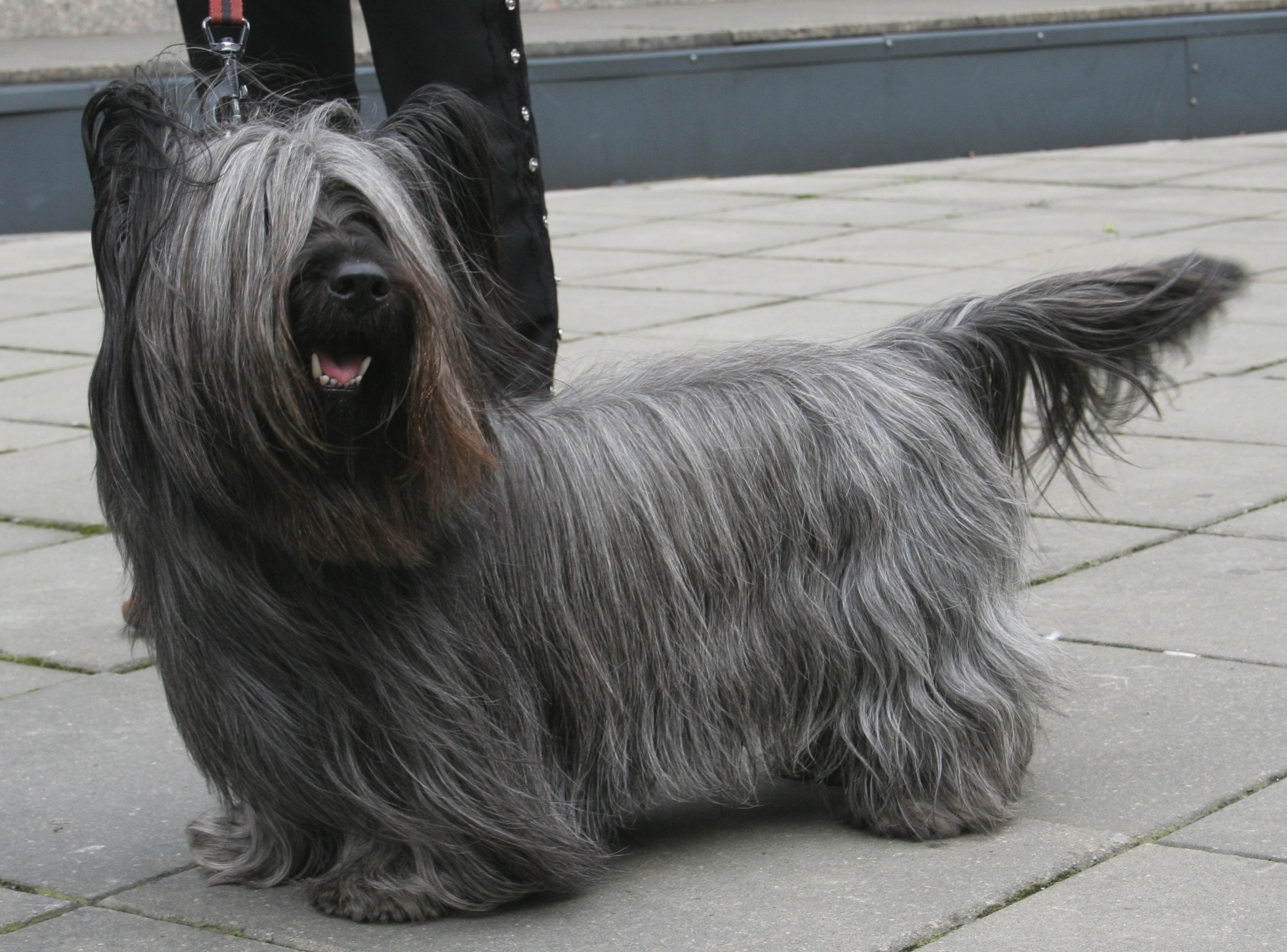- Skye Terrier
Infobox Dogbreed

image_caption = A Skye Terrier
akcgroup = Terrier Group
akcstd = http://www.akc.org/breeds/skye_terrier/index.cfm
ankcgroup = Group 2 (Terriers)
ankcstd = http://www.ankc.aust.com/skye.html
ckcgroup = Group 4 (Terriers)
ckcstd = http://www.ckc.ca/en/Default.aspx?tabid=99&BreedCode=SYT
country = flagicon|ScotlandScotland
fcigroup = 3
fcinum = 072
fcisection = 2
fcistd = http://www.dogdomain.com/FCI/fcistandards/fci-075.htm
kcukgroup = Terrier
kcukstd = http://www.thekennelclub.org.uk/item/85
name = Skye Terrier
nzkcgroup = Terrier
nzkcstd = http://www.nzkc.org.nz/br276.html
ukcgroup = Terriers
ukcstd = http://mail.ukcdogs.com/UKCweb.nsf/80de88211ee3f2dc8525703f004ccb1e/b5143b70dd636fa18525704d006394c4?OpenDocumentThe Skye Terrier is a breed of
dog that is a long, lowterrier that is both hardy and dignified.Appearance
Coat
The Skye is double coated, with a short, soft
undercoat and a hard, straighttopcoat , which must be flat against the body and free of curl. The ideal coat length is 5 1/2 inches (14 cm), with no extra credit for a longer coat. The shorter hair of the head veils the forehead and eyes, forming a moderate beard. The ears should be well feathered and, in prick-eared examples, the hair should fall like a fringe, accenting the form, and blending with the side locks.Colour
Fawn, blue, dark or light grey, blonde, and black with black points (ears and muzzle) all occur. They may have any
self colour , allowing for some shading of same colour on the body and a lighter undercoat, so long as the nose and ears are black. There should be no further patterning on the body, but a small white spot on the chest is permissible.Types
Except for the shape and size of the ears, there is no significant difference nor preference given between the prick- and drop-eared types. When prick, they are medium sized, carried high on the skull and angled slightly outwards. In the drop type, the ears are set lower, are larger, and should hang flat against the head, with little or no muscle movement forwards and backwards.
Grooming
The Skye Terrier coat is resistant to tangling, and needs to be brushed at least once a week. The Skye should be generally kept natural and untrimmed; however, minor trimming of the coat between and around the toes and pads can help avoid problems due to trapped dampness or twigs, pebbles, mud, etc.
Health
Being an
achondroplastic dog breed with extremely short legs, the Skye Terrier has particular health concerns.The most preventable is often called "Skye limp" or "Puppy limp", and it is due to premature closure of the distal radial growth plate. If a Skye is exercised too often, too young, especially before 8 months, they can damage their bone growth, leading to a painful limp and possibly badly bowed legs. Jumping up and down from objects, climbing over objects, running, even long walks, are all things to be avoided for the first 8 to 10 months to prevent later problems and allow for correct closure of the growth plate.Degenerative disc disease is also a common problem in short-legged dogs, and as many as 10% of Skyes will suffer from it.Mammary cancer is the leading cause of Skye Terrier deaths, with
Hemangiosarcoma s (a malignant tumour of the blood vessels),Autoimmune disease , andHyperthyroidism [http://clubs.akc.org/skye/html/archive_12.html] as other concerns of the breed.Overall, the breed is still considered quite healthy, and the average lifespan is 12-15 years.
Under threat
There are concerns that the breed is under threat of
extinction with only 30 born in the UK in 2005 [http://www.telegraph.co.uk/news/main.jhtml?xml=/news/2006/07/05/nskye05.xml] . It is today the most endangered of theVulnerable Native Breeds of this country, and within 40 years the breed may disappear completely. [http://www.timesonline.co.uk/article/0,,2-2221573,00.html] .History
There are at least two versions of the history of the Skye terrier. It was before accepted that the Skye Terrier's origins are connected with a centuries old shipwreck. The story goes that early in the 1600's a Spanish ship wrecked on the
Isle of Skye in theScottish Hebrides . Some of the survivors of the shipwreck wereMaltese dog s that mated with the local terriers, creating a new and unique breed ofTerrier . But a text of Caius, written decades before the shipwreck, describes a very modern portrait of the Skye terrier, proving that the modern Skye terrier existed long time before the arrival of the Malteses :"lap dogs which were brought out of the barbarous borders from the uttermost countryes northward, and they by reason of the length of their heare, make show neither face nor body, and yet these curres forsooth because they are so strange, are greatly set by, esteemed, taken up, and made of, in room of the spaniell gentle, or comforter".
So it is sure that the Skye terrier has inherited very few, or even not, characteristics of the Maltese. As an achondroplastic breed, and looking alike the Welsh corgi, it is believed that the Skye Terrier may have been a result of a crossing between the celtic terriers local to the area and the
Swedish Vallhund of theViking invaders. It may be that the Swedish Vallhund had mated with the local terriers centuries before Maltese dogs were said to have arrived, making both histories true.The Skye Terrier was recognized by the
United Kennel Club on January 1, 1993.ee also
*
Greyfriars Bobby External links
* [http://clubs.akc.org/skye/ Skye Terrier Club of America]
* [http://www.skyecanada.ca/ Skye Canada]
* [http://www.skyeterrierclub.org.uk/ Skye Terrier Club (UK)]
* [http://www.skyeterrier.org The Skye Terrier Foundation]
* [http://skye_terrier.myblox.fr The Skye Terrier World Web Directory]
Wikimedia Foundation. 2010.
